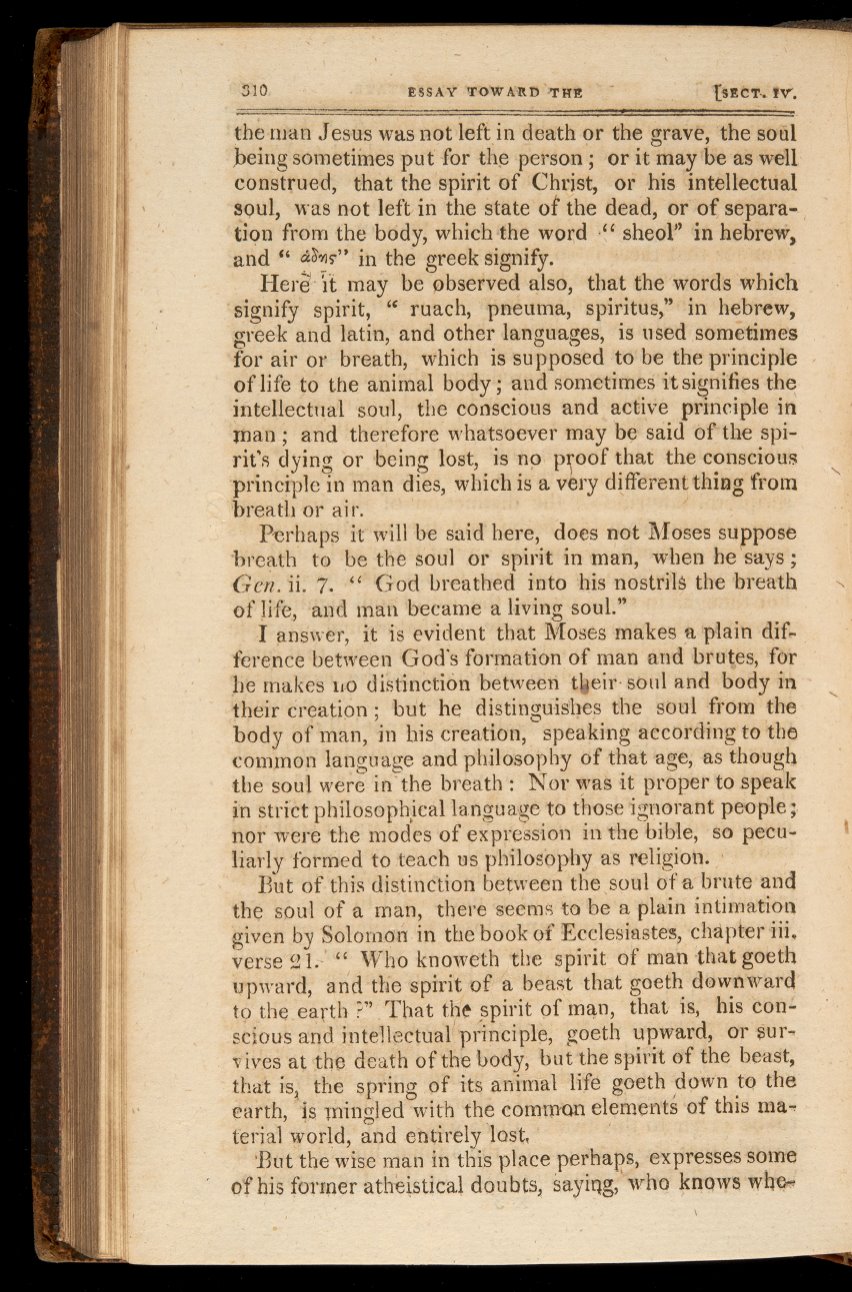

310
ESSAY
TOWARD
-THE
[SECT,
TV.
the
man
Jesus
was
not
left
in
death or the
grave,
the
soul
being
sometimes
put
for the person
;
or it
may be
as
well
construed,
that
the
spirit
of
Christ,
or
his
intellectual
soul,
was
not left
in
the state
of
the dead, or
of separa-
tion
from
the
body, which
the word sheol" in hebrew,
and
"
62ms"
in the greek
signify.
Here-
ít
may be
observed
also,
that
the words which
signify spirit, " ruach, pneuma, spiritus,"
in hebrew,
greek and latin, and
other
languages,
is
used sometimes
for air
or breath,
which
is
supposed to
be
the principle
of
life
to the
animal body
;
and
sometimes
it
signifies
the
intellectual
soul,
the conscious and active principle in
plan
;
and therefore
whatsoever may
be
said
of
the spi-
rit's
dying or being
lost,
is
no
p
-oof that
the conscious
principle
in
man
dies,
which
is
a
very different
thing
from
breath
or
air.
Perhaps
it
will
be
said
here, does
not
Moses suppose
breath
to be
the
soul
or spirit
in
man, when
he
says
;
Gen.
ii. 7.
"
God breathed
into
his
nostrils the
breath
of
life,
and
man became a living soul."
Ì
answer,
it
is
evident
that
Moses makes
a
plain
dif-
ference between God's formation
of
man
and
brutes,
for
be
makes no
distinctiòn
between their. soul and body
in
their
creation
;
but
he
distinguishes the soul from the
body of
man,
in his
creation, speaking according
to the
common language and philosophy
of that
age,
as
though
the
soul
were in-the breath
:
Nor
was
it
proper
to
speak
in
strict
philosophical language
to
those
ignorant people;
nor
were the modes
of
express-ion
in the
bible,
so
pecu-
liarly
formed to
teach
us
philosophy
as
religion.
But
of
this
distinction
between
the
,soul
of
a
brute
and
the
soul
of a
man,
there
seems
to
be a
plain intimation
given
by
Solomon in the book
of
Ecclesiastes,
chapter
iii.
verse
1.
"
Who knoweth the
spirit of
man
that
goeth
upward,
and
the
spirit
of
a
beast
that
goeth
downward
to
the
earth
That
the
spirit of
man,
that
is,
his
con-
scious
and intellectual principle, goeth upward,
or sur-
vives
at the death
of
the
body,
but
the spirit
of
the beast,
that
is,
the spring
of
its
animal
life
goeth down to
the
earth,
is
mingled
with the common
elements
of
this
ma-
terial
world, and
entirely
lost,
But
the
wise
man
in
this place
perhaps,
expresses some
of
his
former atheistical doubts,
saying,
who
knows
who

















